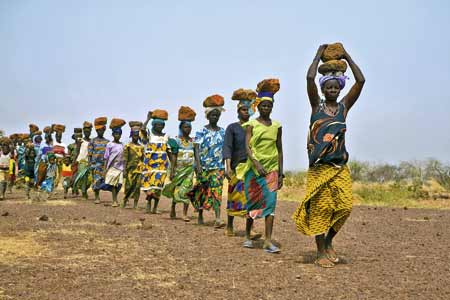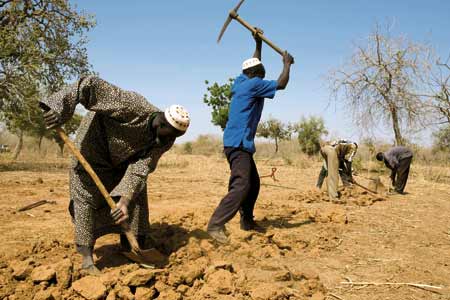
Burkina Faso - Rays of Hope
Issue 58 July 2009
Burkina Faso is one of the least developed countries in the world. Rachel Baird reports on how harnessing solar power could make a real difference to the people impacted by severe climate change in the region.
The beige-coloured earth is so fine and dry that it is more like dust than soil. There has been no rain for months and in places, the West African sun has baked the land as hard as concrete. I wonder how anyone can survive here.
Driving through the countryside, we see nothing but bare earth, dead grass stalks and barely-alive bushes and small trees for miles on end. Here and there, tall trees with deep roots have found enough water to sustain brilliant green leaves, under which thin goats, donkeys, cows and people shelter from the fierce sun.
Northern Burkina Faso is near the edge of the Sahara desert and has always been scorching hot and dry. But in recent decades, the weather has become still more extreme, according to National Meteorological Service records. It is getting even hotter and since the early 70s, rainfall in the parched north of the country has fallen by around 20 per cent.
Climate change is biting hard in this impoverished country of 14 million people, around half of whom are Muslim. The rains have become erratic, arriving at the wrong time for people to grow their families’ food. And sometimes the downpours are torrential, leading to floods which destroy crops and homes.
‘The weather is worse than before because it doesn’t rain a lot and we have many trees that are dying,’ says Salamata Kindo, a thin woman in her 50s. She wears a loose brown top with white polka dots, and has bright yellow fabric tied around her waist.

We do not have ripe millet, because it stopped raining before the millet was ready to harvest, so we don’t have millet to eat. Our trees are also dying and so it won’t be long before it is difficult to find wood to burn for cooking.’
Salamata, however, is relatively lucky. She is one of a group of about 30 women who own a small plot of land with a well, near the town of Gourcy in the north-east of Burkina Faso. Thanks to the well, the women are able to grow immaculately neat rows of onions, potatoes and tomatoes, which they sell to make money to spend on family needs such as clothes for their children. Climate change is only one of Burkina Faso’s problems. The country is the second least developed in the world, according to the United Nations Development Programme (UNDP). Average life expectancy is just 51 and income per person is well below £1,000 a year. Meanwhile, its population is growing fast, with a typical woman having six children.
Some people believe their climate is changing because so many trees are dying – traditionally, trees are said to ‘call the rain’. Others know that climate change is caused by pollution from wealthier countries.
UNDP figures suggest that the average person in Burkina Faso emits around 0.1 tonnes of carbon dioxide a year, while the average Briton emits 10 tonnes – 100 times as much.
Life is incredibly hard in Burkina Faso, and getting harder as the climate shifts. But some people are coping with the changes. A small amount of help has made a huge difference to their lives. Kéléguem village near Gourcy is a desolate place with huge swathes of almost bare land exposed to the elements. Yacouba Savadogo, who is in his 50s and one of the oldest men in the village, says the big trees died first, then the smaller ones, leaving the sandy soil almost bare.
But a local organisation called Reseau Marp, which gets funding from Christian Aid, is helping people to fight back. It trains and supports them in the use of farming methods which conserve precious rain, soil and plant nutrients, so that families can grow more food.
When we arrive, men and women are building low walls made from rocks – ‘rock belts’ - to prevent the rain from sweeping away soil. They also encourage the water to penetrate the soil, where plants can benefit from it.
Yacouba Savadogo says they have enabled the villagers to stay on their land, rather than migrating to the more fertile land in the south of the country. ‘We are only here due to the rock belts,’ he says. Another villager, Saidou Ouedraogo, 35, has three wives and 16 children. He was the first man to build rock belts in this area and says they allow him to grow millet on previously barren land. His success has led others to follow suit. Ouedraogo also uses ‘zai’ - small holes in the soil, into which the farmer puts fertiliser and then plants seeds. When it rains, the water and fertiliser are trapped in the holes, which encourages the plants to grow. ‘I can feed all my children because I use zai,’ he says.
Reseau Marp also teaches farmers to make organic fertiliser and to plant trees. In addition, it is encouraging people to use new seed varieties, which produce crops more quickly to keep up with the shorter rainy season.
One thing of which Burkina Faso has plenty is sunshine. At the solar centre in Tigandalgue village on the outskirts of the capital, Ouagadougou, people are charging up their mobile phone batteries using energy from the sun. There is no electricity in the village and without the solar centre, people would have to make expensive, time-consuming trips into the capital to charge their phones.
Even more impressive are the benefits of solar-powered car batteries, which better-off people use to power lights at night. Without them, people must use oil-burning hurricane lamps, which run out of oil and can be dangerous.
Christophe Yanogo, a father in his 50s, lives near the solar centre. He says that having a battery-powered light at night has allowed him to double his income from basket weaving.‘Formerly it was hard to pay the fees but now it is easy and I am feeding my family better,’ he says.
While Christophe weaves, his 11-year-old daughter, Natalie, uses the light to do her homework. ‘I was using a hurricane lamp,’ she says. ‘It is easier now learning the lessons.’
The problem with solar power – as with help for farmers struggling with climate change – is money. Burkina Faso is terribly poor and its government does not have the resources to help its citizens survive global warming, let alone provide solar centres across the country. We are told that at present, there are only two.
Burkina Faso needs the rich nations which are overwhelmingly responsible for climate change to provide the money and clean technology its people need to adapt to their changing environment – and to develop their economy in ways which won’t exacerbate climate chaos. This is a matter of justice, not charity.
International negotiations are taking place this year on a new climate change treaty, concluding at a UN summit in Copenhagen in December. The treaty can – and must – help deliver such justice. Millions of poor people in Burkina Faso and across the world are already suffering the devastating effects of global warming.
photography Kevin Leighton
Bookmark this |
|
Add to DIGG |
|
Add to del.icio.us |
|
Stumble this |
|
Share on Facebook |
|
Share this |
|
Send to a Friend |
|
Link to this |
|
Printer Friendly |
|
Print in plain text |
|


Comments
0 Comments